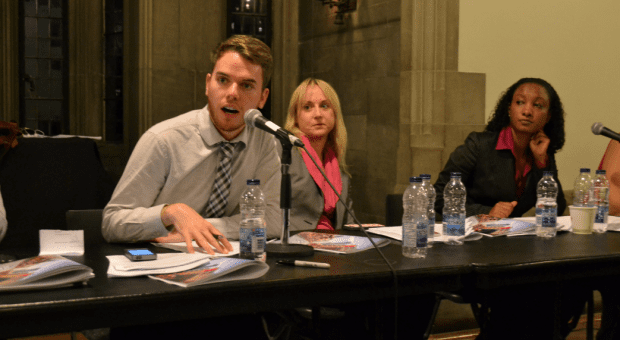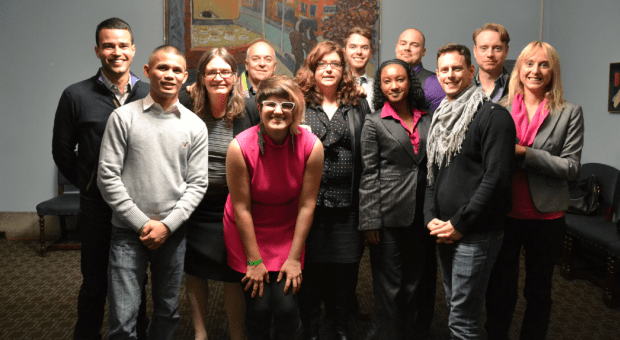
PT co-chair Sean Hiller speaks at the Oct 24 AGM. Credit: Andrea Houston
Pride Toronto (PT) is marching into 2014 with a stable balance sheet, a new set of bylaws and a commitment from the board to make diversity and community consultation a top priority.
At the annual general meeting Oct 24, PT elected three new board members out of five potential candidates, which increases the number of women by one. The three new board members are Dana Suvagau, Aaron GlynWilliams and Chris Tremeer.
“We heard from the community that they want to see a greater diverse representation,” co-chair Sean Hillier says. “We now have five female board members out of 12, which is almost a parity and much better than other elected boards.”
Suvagau, a legal aid lawyer, says she’s already looking ahead to the “post WorldPride years.” She says PT must continue to stay focused on its political roots and keep a strong connection to the community it serves.
“My background is activism and advocacy,” she says, adding that she is concerned that the city annually “holds Pride’s funding hostage” because some councillors oppose the group Queers Against Israeli Apartheid (QuAIA).
For the last three years, in the weeks leading up to the festival, PT has held its breath as some Toronto councillors threatened to withhold funding unless QuAIA was banned from marching.
Ultimately, she says, Pride’s decision to stand with free speech was the right move.
Like Suvagau, Tremeer says he is also focused on what Pride will look like in 2015 and 2016. He hopes the annual battles with council will finally be settled.
Tremeer suspects the city will not launch an attack this year because of WorldPride. He says he’s more concerned with the years following the international festival.
“Politicians are unlikely to raise a stink when the world is watching,” he says. “I’m more concerned with what they will do in the years after WorldPride.”
In his day job, the third new board member, Aaron GlynWilliams, is part of the organizing committee for the Toronto 2015 Pan American and Parapan American Games. Board member Kerry Bell asked GlynWilliams if he will stay focused on PT once WorldPride wraps up and he gears up for the Pan Am Games in 2015.
GlynWilliams says he is “passionate and dedicated” to both events and will remain committed to Pride long after WorldPride and the Pan Am Games are done.
Meanwhile, PT passed new bylaws that it updated in order to bring the organization in line with Ontario’s Not-for-Profit Corporations Act. After they passed, members of the Dyke March moved a number of motions for amendments, including a motion to include language for mandated diversity and accessibility, which passed. Another motion for a commitment to community consultations throughout the year also passed. However, a motion to make the cost of membership a sliding scale, as opposed to a flat fee of $10, failed.
Hillier says the motions will go back to the board for discussion and “fine-tuning,” and if board members feel there is value in adding them into the bylaws, a motion to have the amendments added can be brought forward at the next general meeting, in the spring.
Dyke March team lead Laura Krahn says she feels the board heard most of the community’s concerns, earlier raised at an Oct 17 meeting.
“I’m surprised the motion for a sliding scale didn’t pass,” she says. “It’s something that the community feels strongly about, but that wasn’t represented in this room tonight.”
Krahn says she is pleased that PT is considering mandated diversity, to hopefully reach out and increase access for women, people of colour, trans people and people from less privileged backgrounds to have a voice on the board.
“I’m really happy that Pride has agreed to a commitment to diversity,” she says. “That was a little surprising, but it really speaks to how far we’ve come in our conversations.”
The AGM also approved PT’s audited financials. This is the second year in a row the organization has been in the black, finishing the year with an accumulated surplus of $652,297. (See the full audited financial statements.)
Hillier told members that Pride is currently trying to achieve charitable status in the hope that it can move away from relying on corporate dollars and government grants.
To attain charitable status, an organization must show the Canada Revenue Agency (CRA) that no more than 10 percent of its operations are “political.”
Hillier says the CRA seems to be under the impression that Pride is mostly just a party. “That’s something that we argue against. We don’t think the party is a large part of what Pride does. That’s what they see during the festival, but we do many other things.”
Many in the community — especially those who watched the festival grow out of a political march — would say that Pride is 100-percent political. And it is, says Hillier, but Pride wants the CRA to see “the political nature of Pride,” such as the Dyke March and the Trans March, as “educational.”
“The parties and the beer gardens may be noticeable for the three days of the festival, but we do many other things,” he says.
The CRA has previously rejected PT’s application for charitable status. PT is now in the final stages of an appeal process. Hiller and executive director Kevin Beaulieu recently met with members of the CRA in Ottawa.
“[The CRA] is really focusing on the two or three beverage gardens that we operate as the pinnacle of what Pride is,” he explains. “The street fair, the Dyke March, the Trans March and the parade are educational aspects of what we do. Our push [to the CRA] is that we are out there to educate, limit discrimination and bring awareness.”
Hiller says he doesn’t think achieving charitable status will depoliticize Pride. “I think the political and the educational go along together,” he says. “Much of our political movement is also about educating the general public, and this is how we do it.”
PT also released its 2013 annual report. (Read the report.)
PT WorldPride manager Chrystal Dean gave an update on the planning so far. Over the past year, she says, members of PT have travelled to Chicago, São Paulo, Detroit, New York City, Berlin and Uganda, promoting WorldPride and inviting activists to attend.
“We have also had a presence across Canada, trying to get to as many Pride celebrations as we could,” she says.
Along with the opening and closing ceremonies, a human rights conference and an award gala, all eight former international grand marshals have been invited back to Toronto to take part in WorldPride.
“I do believe they have all said they are free and available, so we anticipate all eight will come back,” Hillier says. “We will also be announcing a ninth international grand marshal soon. The international grand marshals cover every geographic region of the world, so we’re very excited.”

 Why you can trust Xtra
Why you can trust Xtra


